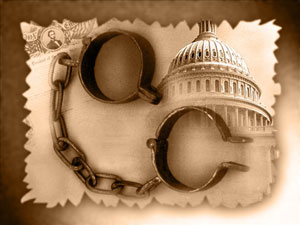Slavery apology resolution passes U.S. Senate
By Ashahed M. MuhammadAssistant Editor | Last updated: Jul 3, 2009 - 9:10:26 AM
What's your opinion on this article?

|
On June 18, the day before the annual celebration of what is commonly called Juneteenth, the resolution's sponsor, Sen. Tom Harkin (D-Iowa), shared words on the floor of the Senate.
“The clerk just read for the first time ever in this body what we should have done a long time ago. An apology for slavery and the Jim Crow laws which, for a century after emancipation, deprived millions of Americans their basic human rights, equal justice under law and equal opportunities,” said Sen. Harkin.
“Millions were kidnapped from their homeland, suffered unimaginable hardships, including death, during the voyage to America. A crime against humanity. In Elmina Castle, on the coast of Ghana, a place I recently visited, there is a chillingly named ‘door of no return.' An infamous open portal which, as one looks over the horizon across the Atlantic, makes all too clear the excruciating inhumanity and horror faced by the men and women shackled inside this castle as they were led through that door and put on the slave ships bound for America. Led through that door enslaved, never to return to their families, their tribe or their native land,” he added.
Four decades after the passing of the Civil Rights Act, 146 years after signing of the Emancipation Proclamation, and for many, most notably, five months into the term of America's first Black president, the U.S. Senate, still a bastion of White male dominance, passed the non-binding resolution, which has no real legal power behind it, and contains a disclaimer apparently aimed at preventing use of this apology to make a case for reparations.
Last year the House of Representatives passed a similar resolution without a disclaimer. The Senate's disclaimer drew the ire of some members of the Congressional Black Caucus, however, at Final Call press time, nothing official has been released on their behalf.
Despite that, reparations advocates believe the apology in no way eliminates the need for a strong united push for reparations.
“I think it (the apology) is welcomed and long overdue,” said Dr. Iva E. Carruthers, a longtime reparations advocate and general secretary of the Samuel DeWitt Proctor Conference, Inc. “I think the disclaimer against reparations attached to it suggests and further attests to the fact that a process of reparations is due,” she added.
President Obama, in a June 19 statement commemorating Juneteenth, mentioned the importance of the Senate's vote the day before.
“This moment also serves as a time for reflection and appreciation, and an opportunity for many people to trace their family's lineage. African-Americans helped to build our nation brick by brick and have contributed to her growth in every way, even when rights and liberties were denied to them. In light of the historic unanimous vote in the United States Senate this week supporting the call for an apology for slavery and segregation, the occasion carries even more significance,” he said.
Juneteenth is now observed in 31 states marking the date slaves in the western U.S. obtained word that the Civil War was over and chattel slavery had ended, some two years after the issuance of the Emancipation Proclamation.
“It is another moment of reminder in terms of our own need to heal and a reminder of what John Henrik Clarke said, that we are the only people in the world who have not taken the time to memorialize such a great tragedy involving their people. Their voices will always be with us demanding of us this process of reparations and healing, both externally and internally,” said Dr. Carruthers.
Related links:
JPMorgan Chase & Co. admits link to slavery (FCN, 02-09-2005)
INSIDE STORIES AND REVIEWS
-
-
About Harriett ... and the Negro Hollywood Road Show
By Rabiah Muhammad, Guest Columnist » Full Story -
Skepticism greets Jay-Z, NFL talk of inspiring change
By Bryan 18X Crawford and Richard B. Muhammad The Final Call Newspaper @TheFinalCall » Full Story -
The painful problem of Black girls and suicide
By Charlene Muhammad -National Correspondent- » Full Story -
Exploitation of Innocence - Report: Perceptions, policies hurting Black girls
By Charlene Muhammad -National Correspondent- » Full Story -
Big Ballin: Big ideas fuel a father’s Big Baller Brand and brash business sense
By Bryan Crawford -Contributing Writer- » Full Story






 Click Here Stay Connected!
Click Here Stay Connected!








